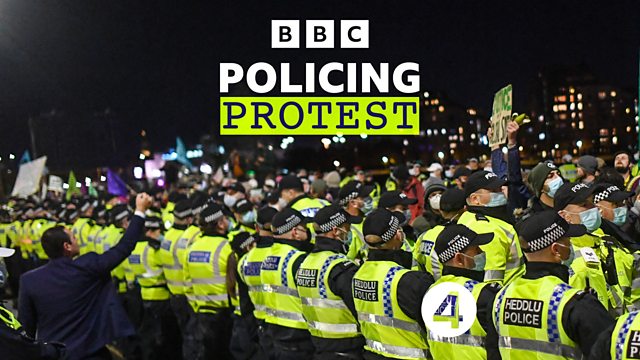Police Force
With protest on the rise and the sheer diversity of groups, tactics and causes Mark Easton explores the policing of protest in the UK from Peterloo to the present - and beyond.
The story of policing is bound up with the history of protest. Far more than dealing with demonstrations on the street, policing owes its very existence to fears of political unrest and to help protect the state from public disorder. In this wide-ranging three-part series, ����ý Home Affairs Editor Mark Easton, with the help of former Police Assistant Commissioner Rob Beckley, tells the story of policing protest in the UK from Peterloo to the present - and beyond.
Episode 1: Police Force
Modern policing in Britain has its origins in protest. The Metropolitan Police was founded by Robert Peel in 1829 in the shadow of the Peterloo massacre ten years earlier where, under instruction from the government, local militia fired directly into the crowd gathered in Manchester in support of voting rights for working men. Peel devised the notion of ‘policing by consent’ as a way of securing support for police within communities, as opposed to using coercive force from without. So simultaneously a police force, an arm of the state tasked with controlling public order and crowd control, that would also be a community service - sensitive and responsive to citizens.
This tension lies at the heart of policing even today and is part of a deeper story of how society contains and manages dissent.
This first episode goes back to the public order roots of modern policing, and explores the secret plan circulated during the Thatcher years to move the police away from 'policing by consent' into something much more militaristic.
Today, policing protest and the control of public order remain at the heart of modern policing. Every week in the capital and cities around the UK the sheer scale, diversity and number of protests is increasing - from domestic issues to climate change and international affairs, with large protests on events in the Middle East. There are huge variations in tactics and the use of social media by different groups – from marching and procession to occupation and ‘static’ protest, direct action and disinformation. And all of this requires policing.
In an era of what police are calling ‘chronic’ protest, resources are being stretched to breaking point. Live social media means the police are under more scrutiny and pressure than ever. Organisations like Extinction Rebellion have brought the capital to a standstill while other groups, like Black Lives Matter, have targeted policing itself as an object of protest. Police tactics like containment (or ‘kettling’) remain controversial, along with recent legislation brought in to increase police powers, such as potentially restricting the length and volume of protest or targeting specific tactics like ‘locking on’, used regularly by Just Stop Oil.
Hearing from police officers of all ranks, activists and agitators from across the protest spectrum, historians, political thinkers, lawyers and journalists – and rich with archive - this series goes deep into the philosophical foundations and real tactics of public order policing. It explores the future of AI in policing protest and new technologies deployed by protestors, the police’s use of crowd psychology, the testing of ‘operational independence’ in the face of political pressure and the regulation of what spaces may or may not be used for public dissent today – the erosion of the protest space, reclaiming our political commons.
Where does the future of protest lie - and with new powers at their disposal, how will it be policed?
Contributors include Matt Twist, Assistant Commissioner for Met Operations; author and police strategy adviser Tom Gash; Melissa Carrington from Just Stop Oil; public order Bronze Commander Jack May-Robinson; Police Sergeant Harriet Blenman; historian Katrina Navikas; crowd psychologist Clifford Stott; founding member of the Race Today Collective Leila Hassan Howe; journalists and authors Matt Foot and Morag Livingstone; human rights lawyer Michael Mansfield KC and Rick Muir, director of the Police Foundation.
Presented by Mark Easton, with reporting by Rob Beckley
Produced by Simon Hollis
A Brook Lapping production for ����ý Radio 4
Last on
Broadcasts
- Mon 22 Jul 2024 11:00����ý Radio 4
- Sun 1 Sep 2024 17:10����ý Radio 4

